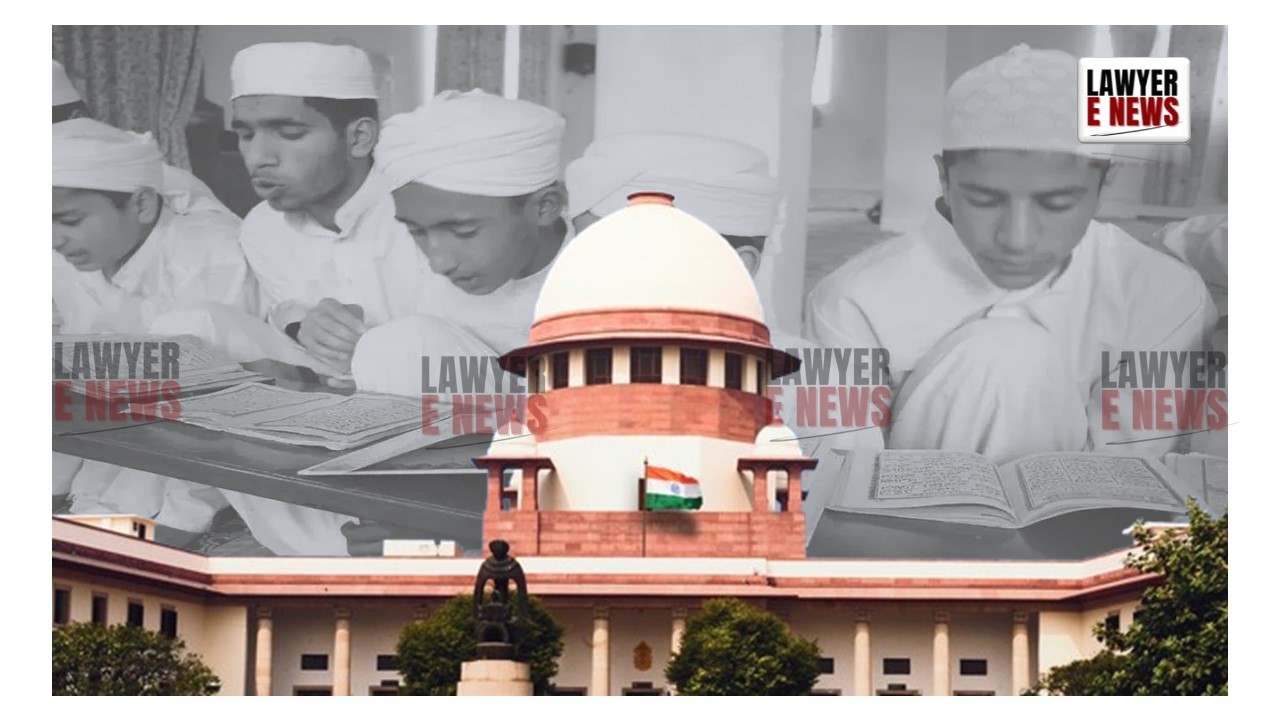-
by Admin
15 February 2026 5:35 AM



On November 5, 2024, the Supreme Court of India delivered a significant judgment in the case of Anjum Kadari & Anr. vs Union of India & Ors., upholding the constitutionality of the Uttar Pradesh Board of Madarsa Education Act, 2004, with certain modifications. The full bench, led by Chief Justice Dr. D.Y. Chandrachud, held that the Act does not violate the secular principles of the Constitution and is within the legislative competence of the State, provided it does not interfere with higher education standards governed by the University Grants Commission (UGC).
Background of the Case: The Madarsa Act was challenged in the Allahabad High Court, where it was declared unconstitutional for allegedly violating secularism and fundamental rights under Articles 14, 21, and 21-A of the Constitution. The High Court ordered the Uttar Pradesh government to shift Madarsa students to mainstream schools. This judgment was appealed to the Supreme Court by the State and other stakeholders, arguing that the Act was regulatory and aimed at standardizing education in Madarsas without infringing on their religious character.
Secularism and Minority Rights: Whether the Act violates the principle of secularism by regulating Islamic educational institutions.
Legislative Competence: Whether the State legislature can enact the Madarsa Act under Entry 25, List III, or if it conflicts with Entry 66, List I, which pertains to the UGC’s powers.
Right to Education (RTE): Whether exempting Madarsas from the Right of Children to Free and Compulsory Education Act, 2009, affects their educational standards.
Equality and Non-Discrimination: Whether the composition of the Madarsa Board, which predominantly includes members from a specific religious community, violates Article 14.
The Court observed that secularism is not an absolute separation of religion from the state but allows for state action to facilitate the education of religious minorities. The Act, which aims at setting educational standards for Madarsas, was held to be constitutional under Article 30, which allows minorities to establish and administer educational institutions of their choice.
"The Madarsa Act is consistent with the positive obligation of the State to ensure that students studying in recognised Madarsas attain a level of competency which will allow them to effectively participate in society and earn a living," noted Chief Justice Chandrachud.
The Supreme Court upheld the State’s legislative competence to enact the Madarsa Act under Entry 25, List III, which allows concurrent jurisdiction over education. However, it held that the Act cannot regulate higher education degrees, such as Fazil and Kamil, as they fall under the purview of the UGC governed by Entry 66, List I. The Court severed these provisions, thus upholding the Act with the exclusion of certain aspects related to higher education.
The Court ruled that exempting Madarsas from the RTE Act does not violate Article 21-A, as the exemption respects the religious and cultural autonomy of minority institutions under Article 30. However, it emphasized the need for the State to ensure secular subjects are taught alongside religious studies to ensure the integration of Madarsa students into mainstream society.
"The positive concept of secularism requires the State to take active steps to treat minority institutions on par with secular institutions while allowing them to retain their minority character," the Court stated.
The Court acknowledged that while the Madarsa Board is largely comprised of members from a specific religious community, this is permissible under Article 30 as long as it includes educational experts regardless of religious affiliation. It suggested adjustments in the Board’s composition to enhance inclusivity and educational expertise without altering the Act’s fundamental structure.
The Supreme Court struck down certain provisions that dealt with higher education standards, specifically the authority of the Board to regulate Fazil and Kamil degrees, which conflict with the UGC Act. This was based on the doctrine of repugnancy, as the UGC Act, enacted under Entry 66, List I, has exclusive competence over higher education standards.
"Only provisions that exceed State competence or conflict with UGC norms require revision, and the entire Madarsa Act need not be struck down on this ground," the judgment clarified.
The Supreme Court’s ruling upholds the Uttar Pradesh Madarsa Education Act, with modifications to ensure compliance with higher education standards under the UGC. The Act’s primary objective of regulating Madarsa education is aligned with the constitutional principles of secularism, minority rights, and substantive equality.
Date of Decision: November 5, 2024
Anjum Kadari & Anr. vs Union of India & Ors.
